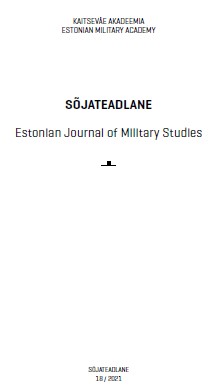PÕLVKONDADE MURRANGUL. SÕJAAJALOO ÕPETAMISEST EESTI SÕJAVÄELISES HARIDUSES AASTATEL 1919–1940
THE VERGE OF GENERATIONS. MILITARY HISTORY TEACHING IN ESTONIAN MILITARY EDUCATION 1919–1940
Author(s): Igor KopõtinSubject(s): Military history, Military policy, Higher Education , History of Education, Pre-WW I & WW I (1900 -1919), Interwar Period (1920 - 1939), WW II and following years (1940 - 1949), Peace and Conflict Studies
Published by: Kaitseväe Akadeemia (KVA)
Keywords: Estonian military education; 1919-1940; Military history;
Summary/Abstract: Teaching military history disciplines have played a significant role in Estonian military education. Its foundations were established by Aleksei Baiov, a Russian émigré teacher and a former professor of the Russian General Staff Academy. It is also important to consider the changes proposed by Lieutenant General Nikolai Reek, an Estonian Chief of General Staff, pertaining to the teaching of military history. As a result of Reek’s activities, military history disciplines and their content were reshaped, military history assignments were established, and the relationship between military history and other branches of military science were clarified, subjecting military history to the needs of tactical training. When he was establishing the grounds of the Estonian military education system, Reek had no choice but to use Baiov and other Russian émigré teachers since there were not many ethnic Estonian specialists in this area. Despite the fact that Reek personally invited Baiov, a conflict quickly emerged between the two men. Although, in the military sphere, they had a different academic aptitude and calibre, their conflict is now part of the legacy of the Nicholas General Staff Academy. On the one hand, Baiov stood out in Estonia for his professionalism, but on the other hand, he represented the older generation of Russian military theorists. From a positive viewpoint, that generation valued systematic research and teaching of military history; from a negative viewpoint, it was hardly connected with modern warfare. It can even be said that Reek played the role of a progressive for the younger generation of Russian military theorists since he saw a fundamental need to modernise military history and its teaching. According to Reek, it should have focused more on studying and teaching modern armed conflicts since the earlier history of the art of war was merely necessary to establish a context for the knowledge. One of the progressive doings of Reek was modernising the teaching of military history through the use of active methods to engage with the audience more personally. He preferred an analysis of military history to mere factual knowledge. Still, military history continued to be taught in a lecture format until mid-1930s; students’ independent and group analysis was not highly appreciated. In addition, the teaching of military history depended on a lecturer’s ability to make the subject attractive to students.
Journal: Sõjateadlane
- Issue Year: 2021
- Issue No: 18
- Page Range: 241-291
- Page Count: 51
- Language: Estonian

